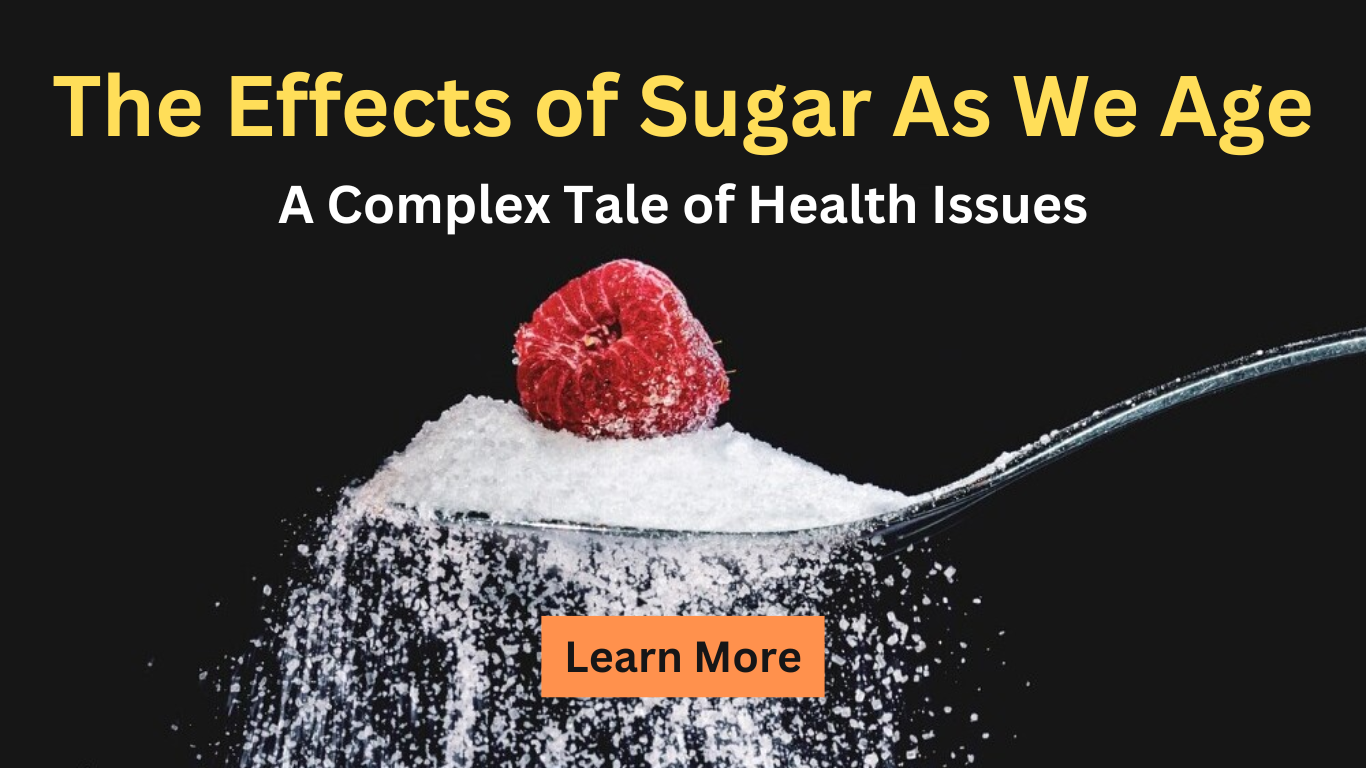
What if I told you that sugar, as delightful as it is, might be quietly weaving a complex tale of health issues?
The Effects of Sugar as We Age – A Complex Tale of Health Issues
Table of Contents
🧁 The Effects of Sugar as We Age: Introduction
Our love affair with sugar has only intensified over time — and so have the health consequences. We’re consuming more added sugar today than ever before, and the effects of sugar as we age are becoming harder to ignore.
From sodas to sauces, sugar sneaks its way into nearly every processed food and drink. But it’s not just the obvious treats that impact our health. As we grow older, even moderate sugar intake can affect our metabolism, mental clarity, energy levels, and risk for chronic disease.
To understand why, we need to break sugar down — literally and figuratively. Simple sugars like glucose and fructose follow different metabolic paths, and their impact can shift dramatically depending on our stage of life.
In this article, we’ll peel back the curtain on how sugar influences us at every age — from growth and mental health to inflammation, fatigue, and even life expectancy. Spoiler: it’s about a lot more than just cavities.
Ready to uncover the real truth about sugar and aging? Let’s dig in.

🍭 Sugar and the Young: Foundation-Laying Years
Childhood is a critical time when habits are formed and nutrition lays the foundation for long-term health. While most kids love sweet treats, the effects of sugar as we age often begin here — quietly shaping health outcomes decades later.
Sugar plays a bigger role in children’s lives than many realize. From sugary cereals to sweetened beverages, it often dominates the diet. But beyond weight gain, sugar affects everything from brain development to emotional stability. Research shows that kids who consume high amounts of sugar tend to have lower cognitive performance — including challenges with memory, learning, and focus.
The developing brain is highly plastic during childhood, forming essential neural pathways. A diet high in sugar can interfere with this process, potentially contributing to long-term cognitive and behavioral issues.
Excess sugar also sets the stage for metabolic dysfunction later in life. Over time, high sugar intake can lead to insulin resistance — a major risk factor for type 2 diabetes. With childhood obesity rates on the rise, many of these issues are now appearing earlier than ever.
And let’s not forget the issue of sugar dependency. Frequent consumption can create a reward loop in the brain, making kids crave sweets and reject healthier options. This addiction-like pattern makes it harder to build balanced eating habits as they grow older.
What can parents do?
- Read nutrition labels. Watch for hidden sugars in everyday foods.
- Swap snacks. Choose fruit, nuts, or whole grains instead of cookies and candy.
- Drink smart. Encourage water or milk over soda and juice.
- Model healthy habits. Kids often mimic adult choices — make yours count.
Helping children develop a healthy relationship with sugar early on can protect them from many of the negative effects of sugar as we age — before they even start.

⚡ Sugar in Adulthood: Peak Performance or Decline?
Adulthood is a time of peak productivity — but also peak pressure. Between careers, relationships, and family life, a balanced diet often takes a back seat. Fast food and convenience meals become the norm, and guess what’s hiding in most of them? Yep — sugar.
While we usually associate sugar with weight gain or diabetes, the effects of sugar as we age during adulthood go far beyond that.
🧠 Mental Health and Mood Swings
High sugar intake disrupts blood sugar stability, leading to emotional highs and lows. Studies link sugar consumption to increased risk of anxiety, mood swings, and even depression. The brain thrives on a steady supply of glucose, but sugar spikes and crashes throw off that delicate balance.
⚖️ Hormones and Weight Gain
It’s a common myth that you can out-exercise a high-sugar diet. In reality, sugar alters your hormonal landscape — especially insulin and leptin, which regulate hunger and fat storage. That means your body may resist weight loss, even if you’re working out consistently.
💆♀️ Skin and Accelerated Aging
One of the lesser-known effects of sugar as we age is its impact on skin health. Through a process called glycation, sugar molecules bind to proteins like collagen and elastin. The result? Wrinkles, sagging, and premature aging — all thanks to too much sugar.
🔍 What Can You Do?
- Check labels. Sugar hides in salad dressings, sauces, and breads.
- Choose whole foods. The fewer ingredients, the better.
- Time your sugar. Save sweets for when your body can use the energy — like post-workout.
- Try intermittent fasting. Many adults find it helps reset cravings and improve insulin sensitivity.
- Invest in a full body composition scale. Tracking more than just weight — like body fat, muscle mass, and water levels — can help you see the full picture of your health as you reduce sugar and make lifestyle changes. Our Recommendation 👉 Oxiline Scale X Pro.
Awareness is the first step. You don’t have to go sugar-free — just sugar-wise. Making smarter choices now can help preserve energy, appearance, and emotional balance for years to come.
🧠 Additional Resource: Intermittent Fasting for Beginners

👵 Sugar and Senior Years: Accelerated Aging and Vulnerabilities
In our senior years, the body becomes more vulnerable to illness — and unfortunately, the effects of sugar as we age can accelerate that decline. What may have once been an occasional indulgence can now have serious consequences.
🫀 Chronic Illness and Inflammation
One of the most troubling links is between high sugar intake and age-related diseases like heart disease, arthritis, and even Alzheimer’s. Elevated blood sugar promotes chronic inflammation, which worsens joint pain, cardiovascular strain, and cognitive decline — making these conditions harder to manage in older adults.
⚡ Energy Spikes That Lead to Crashes
While sugar may give a quick jolt of energy, it’s short-lived. For older adults, this pattern of highs and crashes can lead to fatigue, weakness, and lower resilience in daily tasks. Over time, it can contribute to reduced mobility and independence.
📉 Sugar and Shortened Life Expectancy
Recent studies suggest a correlation between high sugar consumption and reduced lifespan. The cause? A combination of chronic diseases, impaired immunity, and increased oxidative stress that wears the body down faster.
🍽️ How Seniors Can Take Control
As we age, diet becomes even more important — not just for health, but for maintaining quality of life.
- Cut added sugars. Focus on natural sources like fruits.
- Prioritize fiber, lean protein, and healthy fats. These support steady energy and better digestion.
- Stay hydrated. Dehydration makes sugar’s effects worse, especially in seniors.
- Use community resources. Nutritional counseling, group cooking classes, and senior centers can all help with sustainable, healthy eating.
Ultimately, reducing sugar is about more than disease prevention — it’s about preserving vitality and independence in the golden years. The effects of sugar as we age are real, but they’re also manageable with the right knowledge and support.
🧠 Additional Resource: Health and Wellness for Seniors

🚀 Breaking Free: Strategies to Reduce Sugar Intake at Any Age
Curbing sugar cravings isn’t just about willpower; it’s about understanding why we crave sugar in the first place. Both psychological and biological factors fuel our sweet tooth—and each calls for a different approach.
Stress, for example, often drives us toward sugar as a quick comfort, while biological imbalances can physically trigger cravings.
Practical steps to take control:
- Read labels carefully. Sugar hides behind many names—high fructose corn syrup, sucrose, and even “natural” sweeteners like honey and agave syrup. The goal isn’t to banish these completely but to become more aware of when and how much you consume.
- Plan your meals and snacks. For adults, including more protein and fiber helps stabilize blood sugar and curb sudden cravings.
- Stay hydrated. Thirst is often mistaken for hunger, so drinking enough water is key.
For seniors, gradual swaps—like choosing plain yogurt over sweetened versions and adding fresh fruit—make a big difference. Plus, social support from friends and family can encourage lasting healthy habits.
🧠 Additional Resource: Water Retention in the Body – Getting Rid of Water Weight
💊 The Underrated Role of Multivitamins in Sugar-Affected Diets
As we reduce sugar in our diets, it’s equally important to make sure our bodies are getting the nutrients they need. The effects of sugar as we age include not just metabolic changes but also impaired absorption of key vitamins and minerals — especially when a high-sugar diet has been the norm for years.
Chronic sugar consumption can deplete important nutrients like magnesium, B vitamins, and chromium, all of which are essential for energy production, mood regulation, and blood sugar control. That’s where a quality multivitamin can play a helpful role in bridging the gap.
One brand we’ve found reliable is Nature Made. They offer a wide range of multivitamins tailored by age and need, including formulas for adults over 50. Their products are USP-verified for quality and purity, making them a solid starting point for anyone looking to support their health more consistently — especially during and after dietary changes.
Why multivitamins matter more as we age:
- Nutrient absorption slows with age, making it harder to get everything we need from food alone.
- Medication interactions can interfere with nutrient levels in older adults.
- Restricted diets (due to allergies, sensitivities, or personal preferences) may limit vitamin and mineral intake.
A daily multivitamin isn’t a replacement for healthy eating, but it can be a smart supplement to support your energy, immune function, and overall resilience—especially during the transition away from high-sugar habits.
More Great News! Nature Made Multivitamins are also available Here on Amazon.

🍬 The Effects of Sugar as We Age: Final Thoughts
It’s never too early or too late to rethink how sugar fits into our diets. You don’t need to make drastic changes—just small, mindful tweaks can make a big difference. Understanding the effects of sugar as we age empowers us to make smarter choices that support better health at every stage of life.
With a little effort, you can enjoy life’s sweetness in a way that nourishes your body and mind for years to come.
Thanks for reading, we look forward to your visit at EliteHealthAffiliates.com – Your Health and Wealth Authority!

